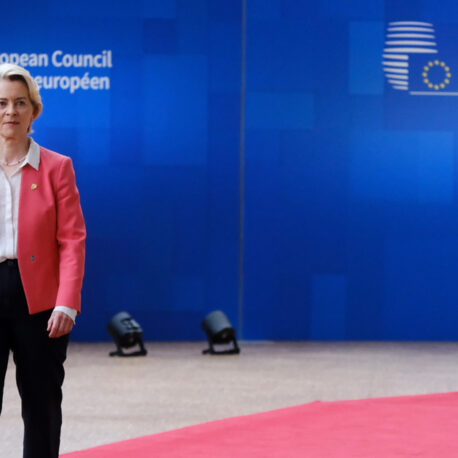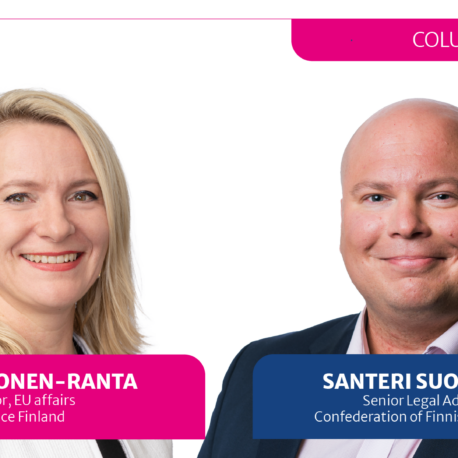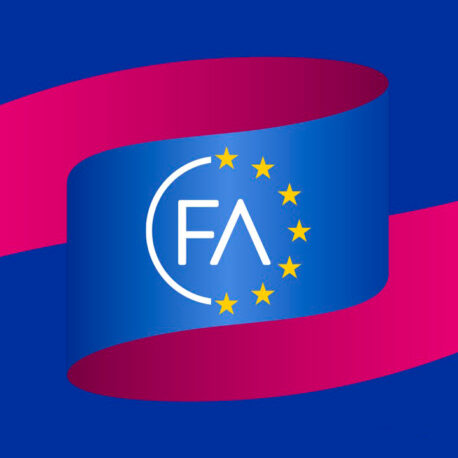
- The EU is facing many significant challenges, such as weak economic growth and competitiveness.
- The functioning of EU regulatory policy has been under critical scrutiny recently, and the simplification of regulation is included in the European Commission’s 2024–2029 strategic agenda.
- Regulation was also the topic of Finance Finland’s EU Round Table webinar. The panellists included Members of the European Parliament Katri Kulmuni and Maria Ohisalo and Members of the Parliament Joona Räsänen and Ville Kaunisto. Director of EU Affairs Mari Pekonen-Ranta represented Finance Finland on the panel.
The EU’s economic growth has been weak for a long time now. The US and Asian economies have long since left the EU in the dust, securing their place as the main engines of global growth in the aftermath of the financial crisis.
The EU’s approach to challenges tends to be prudent and preventative. Regulation is aimed at achieving important goals, such as improving environmental protection and consumer protection, but it sometimes ends up blocking growth along the way.
Regulation was one of the main topics of Finance Finland’s EU Round Table webinar, which sought to find pointers for EU policymakers. The panellists included Members of the European Parliament and the Parliament’s Committee on Economic and Monetary Affairs (ECON) Katri Kulmuni (Centre Party) and Maria Ohisalo (The Greens) as well as Members of the Parliament Joona Räsänen (Social Democratic Party) and Ville Kaunisto (National Coalition Party), who is also vice chair of the Finnish Parliament’s Commerce Committee. Director of EU Affairs Mari Pekonen-Ranta represented Finance Finland on the panel.
The panellists mostly agreed that the EU’s competitiveness is not very good and that the current regulatory approach needs a change of course or at the very least a moderate course correction. To work seamlessly, the economic and political union of 27 countries requires common rules, but panellists felt that more attention should be paid to the quality and quantity of regulation –and quality must always come before quantity.
From mindset change to concrete change
The panellists were largely of the opinion that before agreeing on any concrete changes, EU policymakers could do with a mindset check.
“Policymakers often start a new EU term with very grandiose goals. They would do better to focus on fewer goals and regulatory fitness instead”, pointed out Joona Räsänen.
Katri Kulmuni called for a mindset shift: instead of just increasing regulation and supervision, policymakers should look at issues from a new perspective.
“In the EU, the go-to solution tends to be either a new agency or a new funding programme. Instead of setting up new supervisory units, it would be best to focus efforts on looking for simpler solutions to the problems.”
According to Ville Kaunisto, the EU’s regulatory policy is in need of a critical interim review followed by a host of changes.
“There should be a critical assessment of whether regulation has been a successful strategy. I think the EU should adopt more a market-driven approach and stop trying to solve problems by regulation that stifles innovation.”
Maria Ohisalo considered the common rules established by the EU to be a good foundation, but she also said that the situation of companies could be improved by streamlining practices.
“One example is examining whether we could reduce excessive reporting burdens within legislative frameworks.”
Mari Pekonen-Ranta sees European Commission President Ursula von der Leyen’s political guidelines as a welcome indication of a change of regulatory course. For the first time, the Commission may be getting a commissioner dedicated to simplifying EU regulation and reducing administrative burden. The Commissioner-designate is Latvian Valdis Dombrovskis, who will have a dual mandate as the Commissioner for Economy and Productivity and the Commissioner for Implementation and Simplification.
“The new Commission’s agenda shows clear signs of change. It’s very difficult to dismantle current regulation, but I’m glad to see that the Commission is working to simplify legislation”, says Pekonen-Ranta.
More streamlined solutions to major challenges
The EU is not short of major challenges. The panellists all agreed that in addition to strengthening the foundations for economic growth, the Union must address the threats posed by climate change and biodiversity loss.
In the end, many of the key challenges are closely intertwined – and their common denominator is investment. It is vital to accelerate investments that boost the economy and promote the green and digital transitions. This ties in closely with the Capital Markets Union action plan, which comprises several legislative and non-legislative projects aimed for example at enabling the more efficient use of the EU’s investment potential.
In his opening words to the webinar, Finance Finland’s CEO Arno Ahosniemi pointed out that both the Capital Markets Union and sustainable finance investments need better and more moderate regulation to reach their full potential.
“Regulatory burden is a frequent obstacle on many fronts. We need to take a step back and look at improving existing legislation and rationalising implementation. We should avoid increasing regulatory burden by layering national legislation on top of EU regulation”, emphasises Ahosniemi.
Still have questions?
|Contact our experts
Looking for more?
Other articles on the topic

Hooray for simplifying regulation! But obligations must be streamlined thoughtfully, without compromising environmental goals

Putting EU citizens’ savings to work – Commission seeks growth by promoting saving and investment

Finance Finland’s CEO Ahosniemi: The Commission makes grand declarations for better regulation but fails to back them up with concrete measures in its work programme

The EU needs to build a more favourable investment climate





